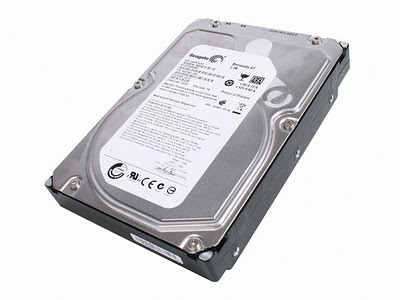Seagate's new 2TB hard disk ushers in the new SATA standard — but don't call it SATA III. Piqued by misuse of the name SATA II (in reality a committee rather than a specification), the SATA standards organisation has urged manufacturers to refer to the new interface only by its official name: SATA 6Gbit/s. That's pretty unwieldy, though, so we're going with SATA/600.
 |
| Seagate Barracuda XT |
As you'll have guessed, the new interface doubles the bandwidth of its predecessor to give a maximum usable transfer rate of 600MB/sec (after taking into account encoding overheads).
That should provide ample headroom for the foreseeable future: in past tests we've found that mechanical hard disks typically read and write at a little over 100MB/sec, and even Intel's super-fast SSDs manage to read at only 250MB/sec.
This being the case, you might wonder why Seagate would bother equipping a conventional drive with a high-speed interface. But although the drive's average performance is held back by its physical capabilities, the Barracuda XT features a whopping 64MB RAM cache, allowing burst operations to take full advantage of SATA/600's bandwidth.
Does this have a noticeable effect on performance? Not in the way you might expect. Across our standard file copy tests the drive performed identically regardless of whether it was connected to a SATA/300 or SATA/600 interface.
That's not to say performance was disappointing: the Barracuda XT achieved some very creditable speeds, averaging 80MB/sec to write our 650MB file and an impressive 144MB/sec when reading it back again.
But we did see a benefit from SATA/600 when we ran the PC Pro real world benchmarks on our standard Core i7 test system using the Barracuda XT as the system drive.
Here, moving from SATA/300 to SATA/600 shaved ten seconds off our Office benchmark, cutting execution time to four and a half minutes. Even better, it cut 27 seconds from the Photoshop test, for a total run time of 3mins 22sec.
The appeal is obvious, but there's always a price premium for new technology, and in this case it's compounded by the fact that 2TB drives are themselves still a specialist market. At £218 exc VAT the Barracuda XT costs nearly £90 more than a bog-standard SATA/300 drive of the same size, and more than four times as much as a typical 1TB drive.
For that reason we can't currently recommend the Barracuda XT for anything but a money-no-object workstation. All the same, it's good to see SATA/600 on the market, and in the years to come we look forward to seeing some more affordable drives that can take proper advantage of it.

Conversion Conversion Emoticon Emoticon